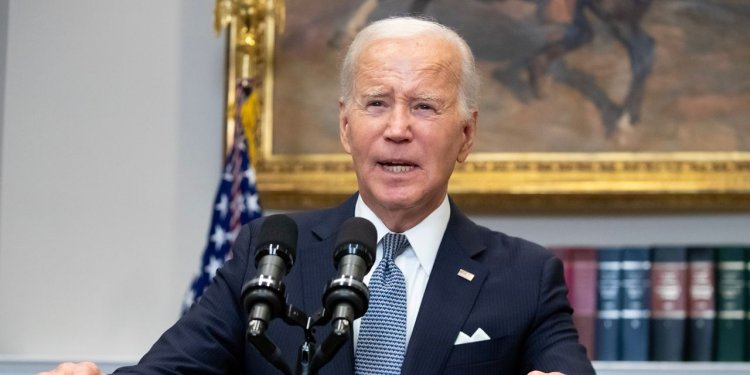The Supreme Court Cancels Biden’s Student Loan Power Grab
The Justices say the President can’t usurp Congress’s power of the purse by cancelling $430 billion in debt. By The Editorial Board June 30, 2023 7:34 pm ET Journal Editorial Report: The ruling puts limits on executive power. Images: Zuma Press Composite: Mark Kelly The Wall Street Journal Interactive Edition No President in memory has exceeded the powers of his office more than Joe Biden, and the Supreme Court keeps telling him he can’t get away with it. The latest rebuke arrived Friday when a 6-3 majority cancelled his unilateral decision to cancel $430 billion i

Journal Editorial Report: The ruling puts limits on executive power. Images: Zuma Press Composite: Mark Kelly The Wall Street Journal Interactive Edition
No President in memory has exceeded the powers of his office more than Joe Biden, and the Supreme Court keeps telling him he can’t get away with it. The latest rebuke arrived Friday when a 6-3 majority cancelled his unilateral decision to cancel $430 billion in student debt in Biden v. Nebraska.
It’s hard to understate the importance of the case for the Constitution’s separation of powers. After Congress rebuffed Mr. Biden’s proposals to cancel student debt, he suddenly discovered in August 2022 the authority to do it himself in the obscure 2003 Higher Education Relief Opportunities for Students (Heroes) Act.
That law lets the Education secretary “waive or modify” student financial aid provisions if he deems it necessary “in connection with a war or other military operation or national emergency.” Mr. Biden had declared Covid an emergency, so his lawyers claimed he could wave away $10,000 to $20,000 for nearly all 43 million borrowers.
Chief Justice John Roberts educated the President to the contrary by noting his Administration didn’t merely waive or modify provisions of the loan program. “The Secretary’s plan has ‘modified’ the cited provisions only in the same sense that ‘the French Revolution “modified” the status of the French nobility’—it has abolished them and supplanted them with a new regime entirely,” he explains.
“Congress opted to make debt forgiveness available only in a few particular exigent circumstances,” he notes. None applied in this case. He adds that the Administration’s use of its “waiver power” is far more sweeping than what any other President has done.
Justice Elena Kagan claims in her dissent, which was joined by Justices Sonia Sotomayor and Ketanji Brown Jackson, that Congress in the Heroes Act purposefully delegated sweeping powers to the President. She ignores that no less than former Speaker Nancy Pelosi said in July 2021 that the President couldn’t unilaterally forgive loans. “That has to be an act of Congress,” she said.
The majority rightly invokes its major questions precedents, which hold that executive actions with major consequences require approval from Congress. The dissent portrays the major questions doctrine as a judicial power grab. “The majority’s stance, as I explained last Term, prevents Congress from doing its policy-making job in the way it thinks best,” Justice Kagan writes.
Au contraire, the Chief retorts. “The dissent is correct that this is a case about one branch of government arrogating to itself power belonging to another. But it is the Executive seizing the power of the Legislature.”
Specifically, in claiming he can spend $430 billion without Congress’s assent, Mr. Biden is hijacking Congress’s power of the purse, which the Constitution expressly reserves for the legislature in Article I. If a President can do that, he can spend money on anything. Imagine what Donald Trump
would do with that precedent if he returns to power.The three liberal dissenters suggest they’d overturn West Virginia v. EPA, the case that elaborates the major questions doctrine. But we wonder if that’s the view they’ll take if the next Republican President tries to imitate President Biden. Our guess is that Justice Kagan might become a major questions convert.
The Court’s willingness to police the separation of powers has become more important as Presidents more frequently try to rule by regulation and executive order. With power unchecked by the judiciary, the administrative state can subvert democratic accountability.
***
Mr. Biden has now lost four big cases at the Court over his executive power grabs, including the vaccine mandate, the rent-eviction moratorium, and the Clean Power Plan. You’d think he’d get the message, but on Friday he showed no regret for his lawlessness.
He vowed “to find other ways” to forgive student debt. In January he proposed to sweeten the
Obama income-based repayment plans by capping monthly payments at 5% of discretionary income and discharging unpaid debt after 20 years.Borrowers who make less than $32,800 wouldn’t have to pay a penny, while the average borrower would save more than $1,000 a year or $20,000 over 20 years. The Penn Wharton budget model estimates this expansion could cost as much as $471 billion, which is on top of the half a trillion or so that is already set to be forgiven.
Congress didn’t authorize the President to cancel student loans on the installment plan either. There’s seldom education in the second kick of a mule, as Mitch McConnell likes to say, but the courts will have every reason to try over Mr. Biden’s next illegal loan cancellation.
Wonder Land: Americans don’t want to forfeit forever their views on abortion or other personal issues. Images: Reuters/Associated Press Composite: Mark Kelly The Wall Street Journal Interactive Edition
What's Your Reaction?













